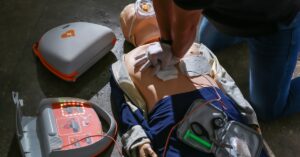CPR has saved countless lives and will save many more. A crucial point in CPR is administering it correctly, and if you have never had proper CPR training or are a little rusty, it’s pretty easy to forget every detail. Of course, you never want to run the risk of being in a situation where you have to administer CPR and do it improperly. Brush up your skills or learn something new by asking, “What are some common CPR mistakes people make?”
Light Chest Compressions
If you administered chest compressions the way you see it done on medical tv shows, you would be doing it incorrectly. You should be pushing down about two inches deep to give proper chest compressions. This may seem like a lot, but think about the ribcage that protects the heart—you must push deep and hard enough past it to access the heart and keep blood and oxygen pumping through the body.
Too Much Air
You would think the more oxygen in someone’s system, the better, right? Wrong. In reality, when administering CPR, you only need to blow air in their mouth for about one second in between compressions. This is a common CPR mistake people make as they think they need to blow more air, but doing so will cause more harm than good since it could lead to vomiting and airway obstruction. If all this information has you wanting to brush up on your skills, consider taking CPR certification courses—you can even take them online!
Calling Emergency Responders
As you are assessing the situation and rushing to administer CPR, you may forget to call an ambulance in the heat of the moment. It’s essential to take a step back, breathe, and remember to abide by the CAB action plan. This will help you follow all the steps needed to save a victim. Moreover, administering CPR is incredibly intensive on the body. Sending for first responders is a vital step that will help prevent any casualties.







